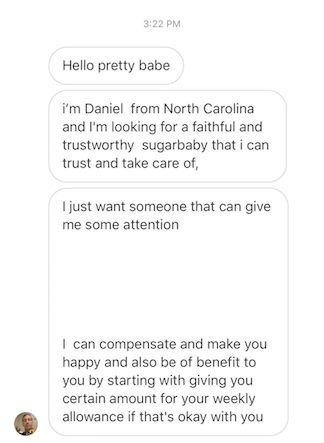Beware Of The Sugar Daddy Scam
Every few weeks or so, I receive an Instagram message request from what appears to be an old white dude with suspiciously few followers. The greeting usually goes something like this: "I'll pay you $xx a week for you to be my sugar baby." Typically the bio on the profile says something similar, "looking for a real sugar baby," "ready to spoil you," "I want to give you the best."
At first, I wondered if old men with some extra pocket change were just getting bolder with their tactics. But after the second or third time receiving a message like this, I knew something fishy was going on. So I did some digging, analyzed some similar cases and found out what was behind all this nonsense. Surprise, surprise, it's a classic sugar daddy scam!

How does it work?
Like any other online set-up, the scammers lure you in through the promise of cold, hard cash. In this particular scenario, the tricksters approach young women on social media who might need help paying their bills because they're in school or unemployed. The scammer then promises the victim hundreds of dollars a week in return for their companionship.
These offers seem legitimate at first glance because there actually are plenty of rich men out there looking for a "sugar baby" to spoil. "Sugaring" is also heavily covered in the media and is openly talked about on college campuses. But if your newfound sugar daddy is texting you in broken English and seems a little too desperate for your attention right off the bat, you might be dealing with the romance version of the wealthy Nigerian prince schtick.

How do they get you?
So let's say you never found this article, and just happened to receive a message like the one above in your Insta DMs. Because you're running a bit low on cash and have always had a sex-positive mindset, you say to yourself, "why not?" You happen to think that "Mike Smith" (who's actually Raj, a 25-year-old dude from India) is actually kind of cute, and your bank account nods in agreement. You decide to pursue a relationship with your mysterious Instagram man.
How exactly does Raj from India swindle over your hard-earned cash under the guise of Mike Smith from Nantucket? The scripts and tactics can vary a bit, but they are usually variations of the fake check scam. In a classic fake check scam, the swindler sends the victim a check as a prepayment for a service or for the purchase of goods: the amount of the check is “accidentally” greater than the amount owed, so the scammer asks the mark for a refund of the difference.
The victim waits for the check to “clear” and then sends the refund by money order or gift card—something conveniently non-traceable and non-refundable. Where is the catch, you say? Banks are required by law to make the funds of a check available within a few days, but it can take weeks for the banking system to actually identify a forged check and stop the payment on it: when the check finally bounces, the victim has already sent real money back to the scammer. Game over.
The Insta variation of the fake check scam usually involves the purported sugar daddy sending fake funds to the victim’s bank or Venmo account. Like a bank, Venmo can make funds available immediately and reverse the transaction later if there is a problem (if a stolen credit card was used to fund the transfer, for instance). The victim is then asked to send a gift card (typically an iTunes or Google Play one) to her “sugar daddy” as a sign of appreciation. Once redeemed by the scammer, the gift card cannot be refunded, but the fraudulent money transfer the victim received can (and will) disappear.
How do you protect yourself?
While I've encountered this scam only through my Instagram account, they're also prevalent on your run-of-the-mill dating apps and on sites that are exclusively dedicated to "sugaring". Here are five tips to avoid being scammed.
- If a potential sugar daddy asks you to send money to him, just don’t! You’re supposed to be the recipient of monetary gifts and s/he’s meant to be the provider: those roles should never, ever be reversed.
- Don’t share your bank account, credit card or debit card numbers (they can all be used to steal money from you). Only share your Venmo or Cash App user names and never give change or refunds.
- Don’t let your potential sugar daddy pay for your credit card bill, student loans or rent directly: those payments are all easy to fake for a few days and you would be giving out a lot of personal information to a scammer. You take Venmo or Cash App only.
- Some social networks and most dating apps are vigilant and tend to block suspicious accounts rather quickly, so scammers will always try to move the conversation over to text or email as fast as possible before their account gets shut down. Make them wait a while before giving out your email or phone number.
- Like most forms of dating, sugar dating is generally an in-person relationship. If a “daddy” seems in a rush to send you money without first meeting in person, it’s almost certainly a scam.
The bottom line
As with any other scam, you just have to use common sense. If it's too good to be true, it probably is. And even if it's not even that good, you should still be wary of who you choose to meet up with and hand over personal information to. Just remember to be careful, practice safety precautions, and don't put yourself in any situations that make you feel uncomfortable. Money is important, but it's not more important than your physical and emotional well-being—those things are priceless.
